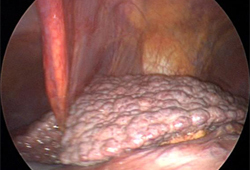Summary
Definition
History and exam
Key diagnostic factors
- abdominal distension
- jaundice and pruritus
- blood in vomit (hematemesis) and black stool (melena)
- hand and nail features (e.g., leukonychia, palmar erythema, spider nevi)
- facial features, e.g., telangiectasia, spider nevi, jaundiced sclera
- abdominal features (e.g., collateral circulation, hepatosplenomegaly, distension)
- altered mental status
Other diagnostic factors
- constitutional symptoms
- lower extremity swelling
- hepatic fetor
- muscle wasting
- peripheral edema
- recurrent infections
- decreased libido
- chest wall features (e.g., gynecomastia)
- dyspnea
- chest pain
- syncope
Risk factors
- alcohol misuse
- intravenous drug use
- unprotected intercourse
- obesity
- country of birth
- blood transfusion
- tattooing
Diagnostic tests
1st tests to order
- liver function tests
- gamma-glutamyl transferase (GGT)
- serum albumin
- serum sodium
- serum potassium
- prothrombin time
- platelet count
- antibodies to hepatitis C virus ± hepatitis C virus RNA
- hepatitis B surface antigen ± hepatitis B DNA assay
Tests to consider
- total iron, total iron binding capacity (TIBC), transferrin saturation, and serum ferritin
- antinuclear antibody
- antismooth muscle antibody
- liver kidney microsomal antibody
- antimitochondrial antibody
- serum immunoglobulins
- serum ceruloplasmin
- plasma alpha-1 antitrypsin
- alpha-fetoprotein
- abdominal ultrasound
- abdominal CT
- abdominal MRI
- upper gastrointestinal endoscopy
- liver biopsy
- imaging-based noninvasive tests
- blood-based noninvasive tests
- portal pressure assessment
Treatment algorithm
all patients
Contributors
Authors
Apostolos Koffas, MD (AUTH), MRCP (UK), FESBGH
Consultant Hepatologist (Locum)
Barts Health NHS Trust
London
UK
Disclosures
AK declares that he has no competing interests.
Patrick T. F. Kennedy, MB, BCh, BAO, BMedSci, FRCP, MD
Professor and Consultant Hepatologist
Barts Liver Centre
Barts and the London School of Medicine and Dentistry
London
UK
Disclosures
PTFK acts as an advisor for Gilead Sciences, Janssen, and Immunocore. PTFK has received grant funding from Gilead Sciences.
Acknowledgements
Dr Apostolos Koffas and Professor Patrick T. F. Kennedy would like to gratefully acknowledge Dr Grace E. Dolman, Dr Keith D. Lindor, and Dr Flavia Mendes, previous contributors to this topic.
Disclosures
GED declares that she has no competing interests. KDL is an unpaid advisor for Intercept Pharmaceuticals and Shire Pharmaceuticals. FM declares that she has no competing interests.
Peer reviewers
Phillipp Hartmann, MD, MAS, DABOM
Assistant Professor - Pediatric Gastroenterology
Hepatology & Nutrition - University of California San Diego
Rady Children’s Hospital San Diego
San Diego
CA
Disclosures
PH declares that he has no competing interests.
James Neuberger, DM, FRCP, Hon
Consultant Physician
Hon Professor in Medicine
Associate Medical Director NHSBT
Queen Elizabeth Hospital
Birmingham
UK
Disclosures
JN declares that he has no competing interests.
Peer reviewer acknowledgements
BMJ Best Practice topics are updated on a rolling basis in line with developments in evidence and guidance. The peer reviewers listed here have reviewed the content at least once during the history of the topic.
Disclosures
Peer reviewer affiliations and disclosures pertain to the time of the review.
References
Key articles
Kaplan DE, Ripoll C, Thiele M, et al. AASLD practice guidance on risk stratification and management of portal hypertension and varices in cirrhosis. Hepatology. 2024 May 1;79(5):1180-211.Full text Abstract
de Franchis R, Bosch J, Garcia-Tsao G, et al. Baveno VII: renewing consensus in portal hypertension. J Hepatol. 2022 Apr;76(4):959-74.Full text Abstract
European Association for the Study of the Liver. EASL clinical practice guidelines on non-invasive tests for evaluation of liver disease severity and prognosis: 2021 update. J Hepatol. 2021 Sep;75(3):659-89.Full text Abstract
European Association for the Study of the Liver. EASL clinical practice guidelines for the management of patients with decompensated cirrhosis. J Hepatol. 2018 Aug;69(2):406-60.Full text Abstract
Rogal SS, Hansen L, Patel A, et al. AASLD practice guidance: palliative care and symptom-based management in decompensated cirrhosis. Hepatology. 2022 Sep;76(3):819-53.Full text Abstract
European Association for the Study of the Liver. EASL clinical practice guidelines on the management of hepatic encephalopathy. J Hepatol. 2022 Sep;77(3):807-24.Full text Abstract
Reference articles
A full list of sources referenced in this topic is available to users with access to all of BMJ Best Practice.

Differentials
- Budd-Chiari syndrome
- Portal vein thrombosis
- Splenic vein thrombosis
More DifferentialsGuidelines
- AASLD practice guidance on acute-on-chronic liver failure and the management of critically ill patients with cirrhosis
- AASLD practice guidance on risk stratification and management of portal hypertension and varices in cirrhosis
More GuidelinesPatient information
Cirrhosis: what is it?
Cirrhosis: what are the treatment options?
More Patient informationCalculators
NAFLD Fibrosis Score
More CalculatorsVideos
Abdominal paracentesis animated demonstration
More videosLog in or subscribe to access all of BMJ Best Practice
Use of this content is subject to our disclaimer